I am very passionate about the power of language. I’ve been told I’m too sensitive when it comes to words and semantics, but I wholeheartedly disagree. I’ve written before about the way our language shapes the way we perceive the world, especially when it comes to our language around people. Today I would like to tell you one of my biggest pet peeves in helping work:
Calling clients entitled.
Let me tell you what I mean;
Imagine you are a young mother in need of diapers and wipes for your toddler. You’re meeting with a county social worker and you hear about an organization that might be able to give you what you need, along with some financial help. You decide to make the trek across the city to this agency even though it’s out of the way, your toddler in tow. You arrive exhausted, stressed, and overwhelmed, waiting anxiously for someone to meet with you so you can get what you need and make it to your next appointment on time. When someone approaches you and says hello you tell them directly, “I heard you guys give out diapers and wipes, I need them. And I heard you give people money for bills, I need that too. And I need it right now because I have to go, I’m really fucking busy and I don’t have time to sit here all goddamn day”.
Even though some of us might understand this person’s reaction to the staff member, in the eyes of a lot people who work in social services, it is unacceptable. I can almost guarantee what will happen next; that staff member will waltz into their office or their next meeting and complain about the “entitled client” who came in today.
“They think they can just walk in, speak like that, and we will give them whatever they want; can you believe that?”
The staff person may choose to prioritize other, more “polite” clients, making this person wait longer. Or they might deny the person help altogether.
It happens every single day.
Over time I have come to realize that “entitled” is coded language used to reinforce the power dynamics that are ever-present in social services and helping roles; we are the “professionals”. We take time out of our lives to be here with these kinds of people. We deserve to be revered for our kindness. We are the experts, we know what you need, and, more than that, we know what you deserve. If you don’t play the game and stay within the boundaries of your role as the “needy person”, it will be exponentially harder to have your needs met.
I encountered this phenomenon daily the first time I worked at a non-profit. I supported parents who needed respite care and basic needs for their kids. As you can imagine, it was quite intense work. Very early on in my role, I observed that the parents who got their needs met the quickest and most holistically were the ones who were overly gracious, kissing the ground we walked on when, in reality, we were giving them the very bare minimum everyone should have. Diapers. Groceries. Formula. Winter coats. If anyone encountered a client who was short and direct, the staff would have a fit. “Can you believe that mom?” they would say, “She was so entitled”.
What people are truly saying when they say “this client is so entitled” is, “I want people to enter this space and acknowledge this hierarchy, to reinforce how gracious and kind I am for using my time to help someone like them. I want to be put on a pedestal for being the best helper and the most virtuous person; anyone who does not give me that is disrespectful”.
This reinforces separation, giving “professionals” the illusion that the people who need help are below them and allowing them to feel they have some control over that person’s life (because, obviously, they can’t be trusted to know what they need).
What makes me most upset is that these “rules” are internalized by many of the people asking for help. Much like what I discussed in my post “beggars can’t be choosers”, the ideology and power structure in social services runs so deep that many of those in need believe it to be true. I cannot tell you how many times I’ve heard the language of entitlement used from client to client, with those who have internalized their role in the power dynamic so deeply that they don’t even know it has happened.
I am not suggesting that harmful language and actions shouldn’t be addressed- but I am saying it is crucial not to categorize someone as less deserving because they showed up in a way that makes you feel icky. It is also important to reflect on whether or not someone’s actions are actually harmful. Someone yelling is not dangerous. Someone being short or rude is not dangerous. Those are just different ways of communicating and they are not usually harmful.
Entitled means feeling that one is inherently deserving. I believe that every single person is inherently deserving of everything they need to live a comfortable, happy, joyful, and safe life. Just because someone does not inflate your ego with praise or bow down to the hierarchy you’re desperately clinging to doesn’t mean they are less deserving. We are all entitled to what we need. Period.

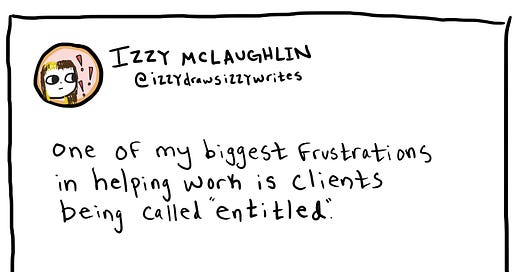



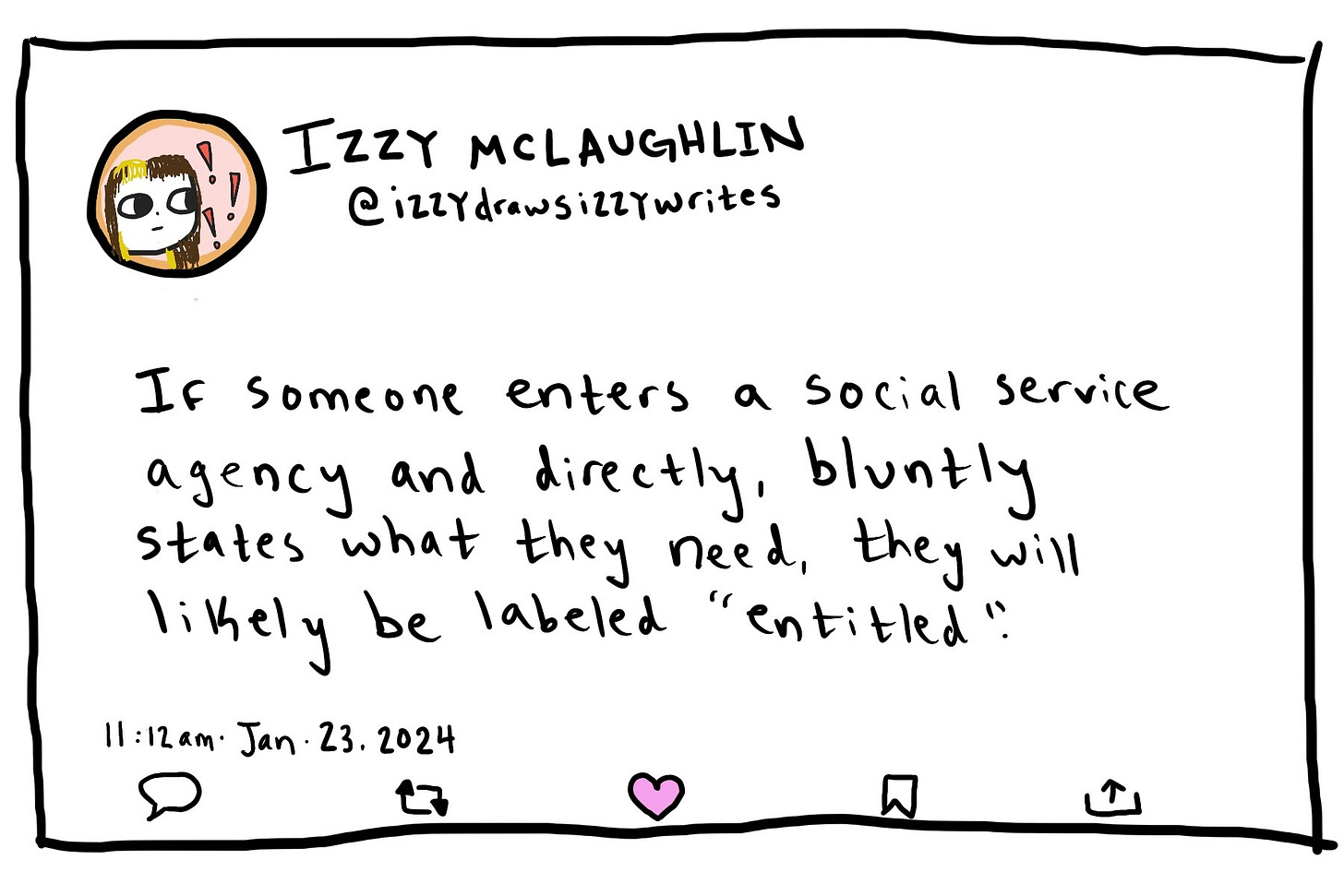
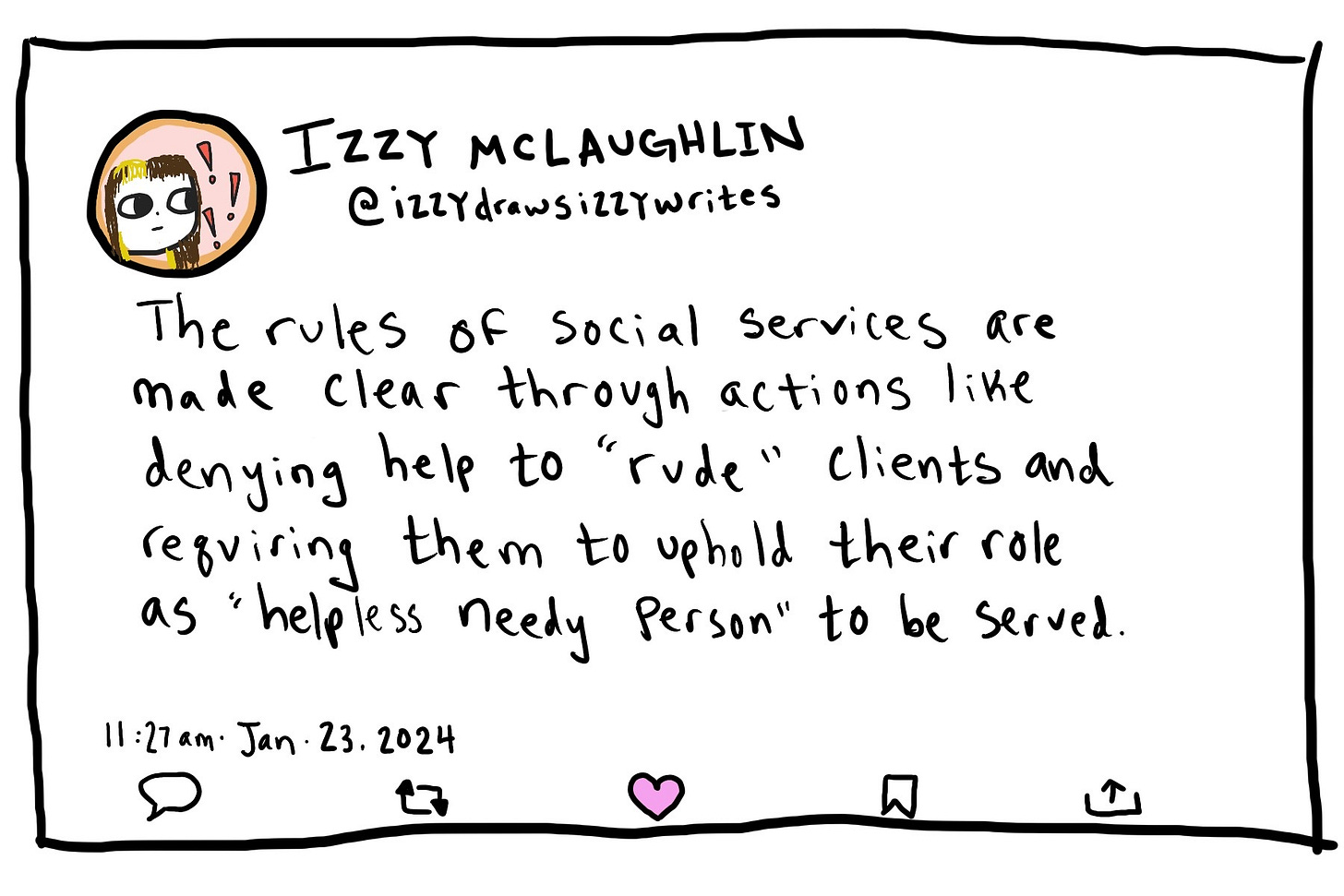
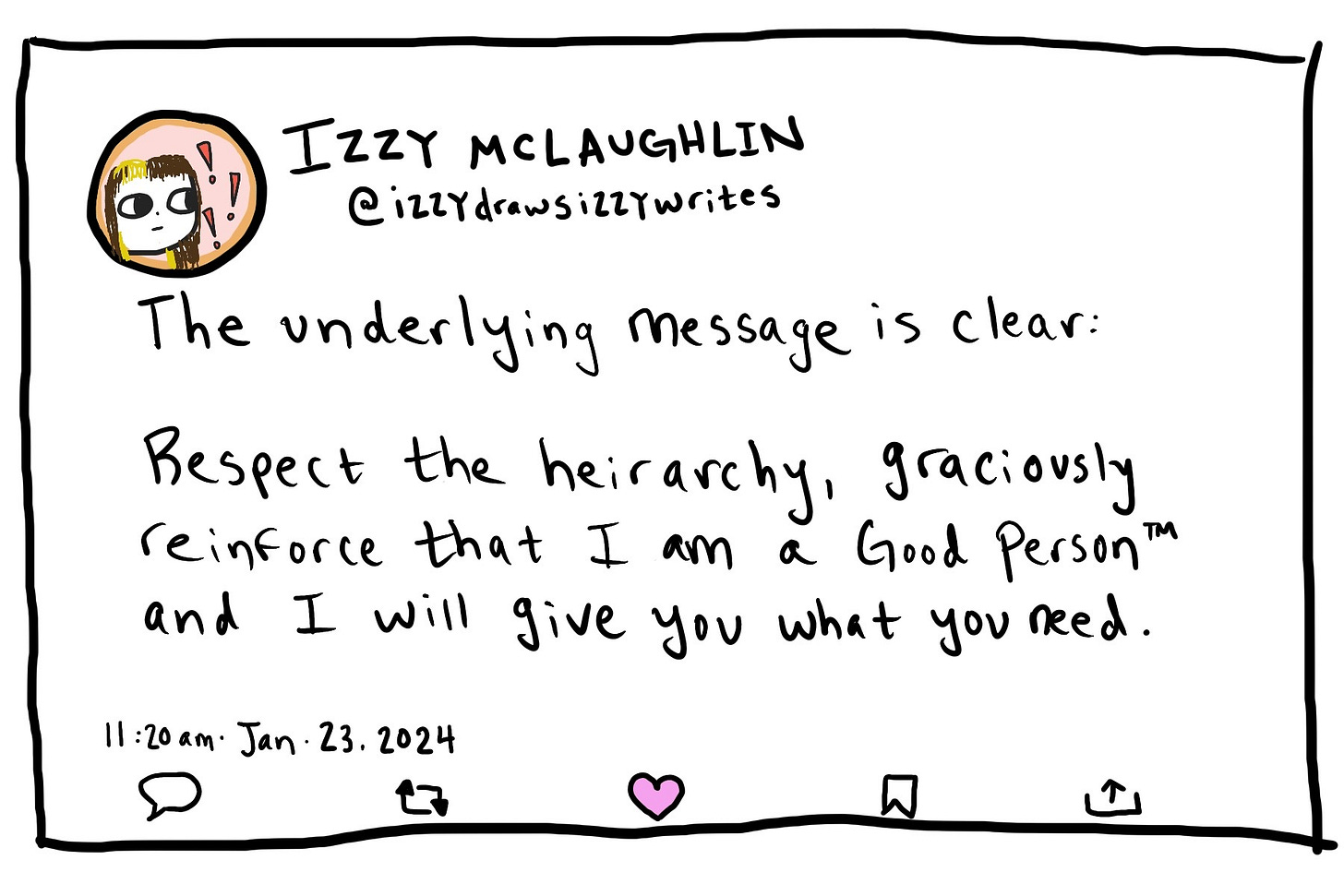
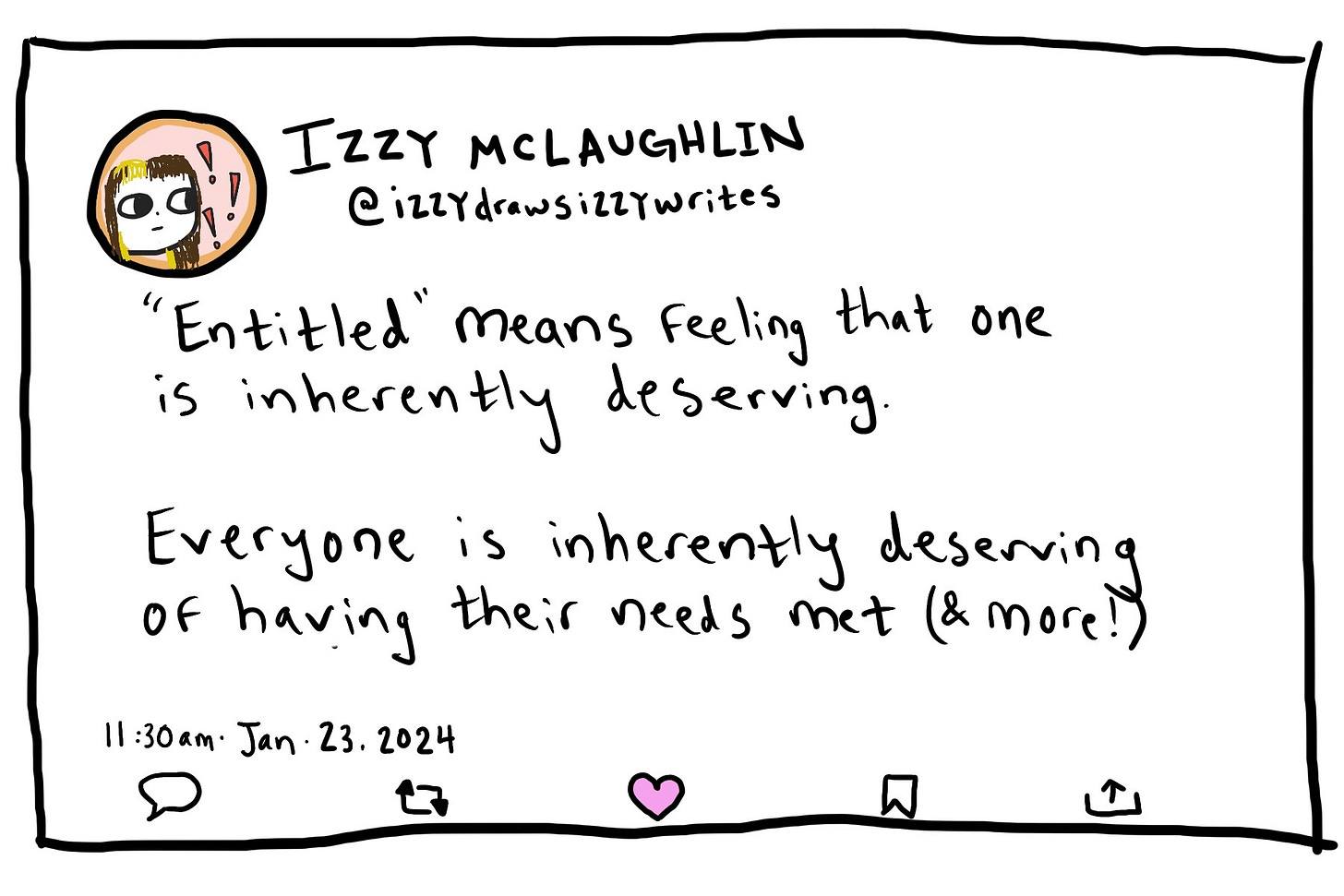
Thank you for this post. I couldn’t agree more! I have been volunteering at Blanchet House, a cafe that provides three hot meals a day to anyone. Our guests are shown to a seat, served meals and drinks, and treated like beloved guests. It’s not always calm and the guests are not always respectful, but I think as a volunteer it’s been good to take the posture of a servant instead of a benefactor.
Yes! I work with refugees, and I've noticed this too. Sometimes it's even cultural. For example, a volunteer who collected clothes from her neighbors for an Afghan baby was really disappointed at how the mum put away the bags without even opening them, much less ooh-ing and aw-ing over their contents. But her behavior was respectful for Afghan culture, where it's rude to acknowledge a gift in the giver's presence. There's an excellent book called "The Ungrateful Refugee" that looks at this phenomenon, among other things. (link to post I wrote on it a bit https://open.substack.com/pub/planetnomad5/p/grateful-refugees?r=6ax0c&utm_campaign=post&utm_medium=web)